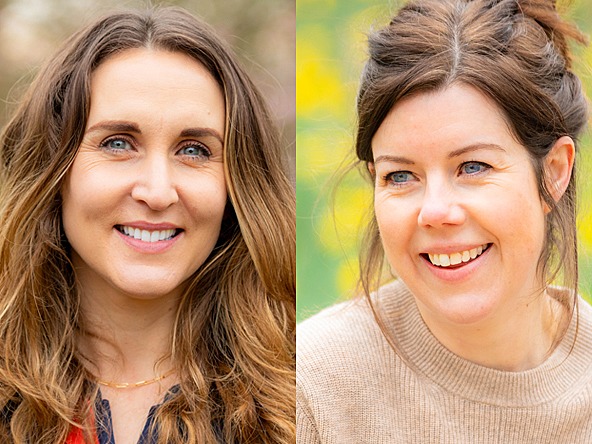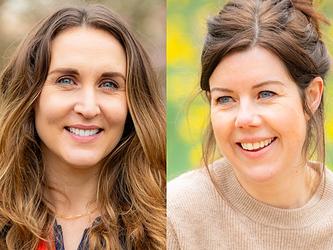Q&A: How a job share turned into a business for Wren Insight

Katie McQuater (KM): How did the job share at John Lewis (JLP) come about in the first instance?
Hannah Beech (HB): I was working as a contractor and JLP wanted to introduce a policy of partnering up contractors so they could cover a full-time role. So, we got matched up. Another colleague thought we would work well together, so after a couple of months, what was a part time role for me turned into a job share role. We were both working part time but I was covering three days a week and Jude was covering three days. It really came about because JLP was keen to allow members of the team to continue working part time but not have continuity problems across projects.
Jude Terry (JT): At the time we were put together, about a third of the research and insight team were part time. It obviously represented a big chunk of the workforce, and everyone had different arrangements, so it was a different way of looking at part time work. We were really lucky because we were put together and it just worked.
We embraced it and for us it was short term – six months and then it rolled over to another six months. I think that helped us figure out if it was going to work, and how to make it work. All job shares probably need that time to work out if it is for them.
KM: Did you work together one day a week?
HB: Yes, and we’ve carried that on. I work Monday to Wednesday and Jude does Wednesday to Friday, with that day in the middle to cross over and hand over. Working client side and working on projects, there is quite a lot of detail to hand over, so having that day together was really useful.
We did a lot of bits and pieces across projects, but having a day to use that time to brainstorm, analyse or do those parts of projects that work a lot better by talking about it, worked really well. So, we tended to save those things for our Wednesdays together when we could.
KM: How does your model work now that you’ve launched Wren?
JT: Working in a job share in a corporate is different to being in a partnership in an agency. There are some similarities – on the one hand, we stick to our job share days, but we’re a lot more fluid and flexible to working with each other across the week. A job share is a really great foundation for building a partnership and servicing our clients across the week.
We have handovers, we have very clear systems and processes in place for handing over, but on the days when we’re not working, we are happy to dip in and out as we need to help the work flow move on – it’s a bit more fluid. In a corporate culture, you very much stuck to your three days.
Working part time can have a negative narrative. In businesses, you can feel like you work four days but get paid for three – that’s a common narrative. I think it’s very hard to just do your job within three days, especially in market research. Your debriefs stay at the same dates. Your project times don’t pro-rata. The job share helped reframe the narrative to be really positive for us because we could just pick up our work and put it down and know it was going to be really looked after – a big part of a job share is the trust you build with your job share partner because you can’t micro-manage them and they can’t micro-manage you. You have to really pass the baton over.
I think a lot of those skills stay the same when managing an agency. It’s broadened out a bit more and we now have a much deeper understanding of each other and what our strengths and where our blind spots are; that’s really helpful for building a partnership. That’s what all job shares need – you’re not the same people; you’re going to have different skills. It’s a bit of a jigsaw puzzle finding the right person. There’s no absolutely perfect fit either and accepting that is a big part of a job share.
HB: It’s about working in a similar way, but you also have complimentary skills as well. It’s good when you find someone with a similar working style, which for us it is, but we do have slightly different skillsets within qualitative research, so we can bring different things to the party. Running your own business with diverse skillsets makes you stronger.
It is slightly different to working in a job share client-side as a contractor, because your job is much more prescribed to you, whereas now we’re creating our own reality and that means drawing on or learning skills we thought we’d never need to develop. You really have to rely on each other, trust each other and enjoy it. When you do it with someone else, it’s really fun, and it takes a lot of the stress away.
KM: What are the challenges of job sharing?
JT: It requires you to be super organised and very good at communication, so it depends if you’re naturally good at those things or not. You turbo charge, you’re accountable to each other and the other person can only start their working day strongly if you’ve handed over strongly. So, there’s a yin and yang element to it where you are codependent on each other to do your bit.
I don’t really see it as a challenge, but it also means getting used to being brutally honest: ‘Well, I think you’re wrong on that.’ we’re both comfortable with each other’s constructive criticism, which is really healthy.
HB: When you work for a bigger company, it’s harder to always feel that sense of investment and wanting to deliver. When you’re doing it as a partnership and a business, you really want to deliver for the other person. The challenge is you make yourself work really hard, which is great but sometimes you’re working late to make that happen. It is a challenge trying to make that work with children and families. Because we don’t work full time it does feel OK, as we do get down time at other points in the week.
JT: Another challenge is that when you do it in a contracting capacity it takes the ego out of it because you are a contractor, rather than having a permanent position. One of the things you have to accept in a job share is that ‘we are in this together – it’s my career but this role is ours and it’s shared. Everything that is a success is our success – it’s not mine and it’s not hers.’ I think that is a mental barrier that you have to get over – it’s a different way of thinking about your role. It can be a real shift for some people, who are very singular in their career and their achievements and climbing a ladder. However, I think the benefits outweigh that.
KM: Your approach feels similar to the well-established ad industry creative team model. Is there a missed opportunity here for the research sector? Should the industry be facilitating more job share roles?
HB: I started my career in advertising on the planning side, and I think there are crossovers with creative teams and that collaborative way of working. Obviously, with copywriters and art directors, they do have complementary roles, but could a good job share model be a quallie and a quantie? Maybe there is a bit of a missed opportunity to bring people together – people do partner in some agencies across seniorities but it’s not something everyone does.
JT: It’s like a Venn diagram: you’ve got to have quite a lot in common before you can make those complementary skillsets support each other. There’s a huge challenge in the research and the advertising industries of keeping women in the industry in their 40s and 50s. A lot of women fall out after having kids and being off on maternity leave and then become freelancers. It’s really sad – when you get to senior director level and board level in great agencies, for us, we were finding that not many of them were women. A [job share] can really help women feeling that part time can work for them.
I don’t think industries talk about job shares. When we’ve gone out to corporates and agencies and talked about our job share, either they’re really interested and want to talk about it, or they’ve been quite nervous about it and not understood and have struggled to see how it could work, that they’re not just paying us twice. It’s been a bit of an education piece in some agencies and some agencies are really accepting and happy to give it a go. It’s a real mix.
HB: One thing we often say, and we truly feel, is that they get two brains rather than one. Things are much better talked about, collaborated, on, brainstormed together and analysed together.
KM: Is there anything else that those considering a job share should be aware of?
JT: The thing to think about is how to find a good job share fit. We felt incredibly lucky because we were put together. It could be that there are obvious people within your company that you could see yourself having a job share fit with.
HB: When you can go on the journey together, it does take away some of the anxiety or stress or how daunting it can feel to start a new client-side job or whatever the challenge might be. If you can do it together and collaborate, it turns that emotion into excitement rather than anxiety and you can always support each other. When you have pinch points in your life, you can lean on the other person. If you were doing it on your own, you’d just have to iron it out yourself.
JT: I think you develop personally in job shares, because you see there’s no one way of doing things, especially in research. It’s a good learning opportunity and you do much more than just working by yourself or running a team by yourself. You grow in a different way and that’s really fun. Freelancing can be lonely, and it can be lonely coming back part time after having children, so it also provides company.
Pictured: Wren Insight founders Jude Terry and Hannah Beech
This interview has been lightly edited for clarity

We hope you enjoyed this article.
Research Live is published by MRS.
The Market Research Society (MRS) exists to promote and protect the research sector, showcasing how research delivers impact for businesses and government.
Members of MRS enjoy many benefits including tailoured policy guidance, discounts on training and conferences, and access to member-only content.
For example, there's an archive of winning case studies from over a decade of MRS Awards.
Find out more about the benefits of joining MRS here.













0 Comments